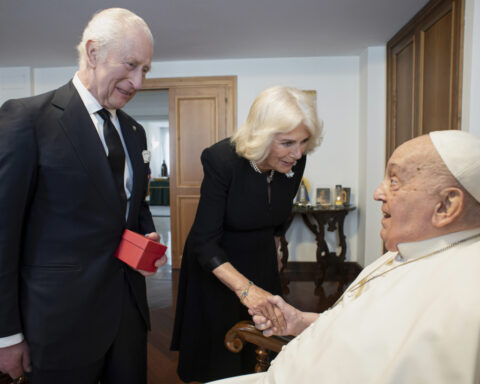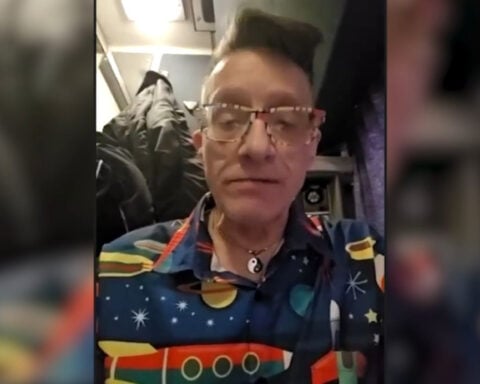Strolling along Melrose Avenue with a cappuccino in hand, you notice your reflection in a boutique window and can't help but appreciate how great you look today. People call it "main character energy" – when someone carries themselves as the protagonist of their own story. Experts say this self-affirming perspective can be healthy and help prioritize self-care as long as it's not taken too far.
"When you think of movies and the main character, that's the person you're following, that's the person you're rooting for," says Raquel Martin, a licensed clinical psychologist in Los Angeles. "I see it the same way – you should be rooting for yourself; you should be the main character. There's nothing wrong with having that energy."
Main character energy is not an official psychological concept but a cultural phenomenon centered around self-confidence. It is essential to differentiate it from a narcissistic personality disorder, as the latter is a severe personality dysfunction that impacts only around 1% of the population. Rather, main character energy represents a shift toward prioritizing one's own needs and establishing personal boundaries.
Martin encourages her patients to embrace main character energy. To her, it signifies that they are focused on their own wants and needs when they come to therapy rather than trying to please someone else. This aligns with larger cultural trends towards self-care and self-preservation over selflessness or selfishness.
Taking charge of one's life narrative can be empowering, but main character energy still needs balance. "When pushed to the limit, it may lead to other outcomes," Christina Charlotin, a licensed clinical psychologist in Los Angeles explains confidently.
Think of the main character metaphor – a protagonist typically struggles with outside challenges. "Sometimes people have mental health difficulties because they feel like they're the main characters in everyone's story," Martin explains.
Over-identifying as the leading role in other people's lives is not the same as being the main character in your own. Giving yourself "me time" is different from making everything about you. The key is knowing when to pull back. To keep the main character's energy in check:
- Don't overdo it. There's a difference between indulgent self-care and reasonable boundaries. "Main character energy is preserving your limits. It's taking a rest when you need it. It's saying no when you want to," Martin advises.
- Remember, you're the lead in your story. "I find sometimes people really do want to be the main character in everyone's story and want everyone to like them," she cautions.
- Check yourself if criticized. Consider if a charge of self-absorption holds truth or reflects the other's insecurities. "All those factors should be looked at when working through what that comment means," says Charlotin.
The goal is to strike a balance between selflessness and selfishness – where you can still be present for loved ones but without burning yourself out.
For Melanie Hill, 38, main character energy is as simple as feeling herself when she looks cute. "I will literally walk by a mirror or reflection and be like, yes! Werking it!" says the comedian and actress from Studio City, CA.
Hill watches how she moves through the world and makes sure not to expect special treatment. But she sees nothing wrong with healthy confidence. "I don't see it as ego or narcissism. I see it as being proud of yourself," she says.
That pride extends beyond surface-level validation. "Main character energy is also, I worked out hard to get this body. Or I worked really hard in therapy to get to this point. Whatever the thing is, celebrate that," Hill explains.
She admits her self-assurance can intimidate dates. "I've had guys be like, something about how you carry yourself is a lot. And I'm like, oh no, I'm sorry, I'll dim my light!" Hill laughs. "Not really. This is the light."
But she knows when not to steal someone's thunder. "You can't overstep somebody else's experience for your own," Hill says.
For others, like lighting designer Alexis Baskerville, 32, main character energy means protecting your peace first.
"It's about understanding and setting boundaries and limits so that you can preserve your energy," explains Baskerville, who lives in Long Beach, CA. She used to overextend herself to satisfy others' expectations. But the pandemic shifted her mindset. "There was a lot of opportunity for self-reflection. What do I actually want?" Baskerville says.
Now, she interrogates every invitation and commitment presented her way. She also practices saying no without guilt or explanation. Her main character energy materialized as reclaiming agency over her time and wellbeing.
"When we think of main characters, it's all about them, right? So translate that into your everyday life – you are the main character," Baskerville declares.
Clinical psychologist Charlotin views main character energy as Generation Z trying to rewrite old social contracts in order to meet their needs. She finds this age group tends to reject selflessness for its own sake.
"It's not necessarily selfish; it's just different. It's saying I matter too," Charlotin observes. "And because you matter, I can show up better in all these other spaces instead of showing up depleted." Though the trend alarms some older generations, Charlotin encourages keeping an open mind. "We have to make space to understand it rather than judge it as right or wrong," she counsels.
Martin agrees. She sees clients struggling to voice basic needs without shame. For them, even small acts of self-care feel daring. "It's sad that the bar is so low that taking a mental health day could be considered main character energy. Getting a massage when your body hurts could be considered main character energy," Martin says.
Owning your needs should not feel so bold, in her view. "I don't actually think it's main character energy," Martin concludes. "I think it's a human needing human things." So, where did this concept of "main character energy" come from? Some trace its origins to stan culture and internet fandoms.
"Stans" zealously support and identify with celebrities or fictional characters. Being your "fave's" number one fan becomes part of your identity. Dr. Michelle Cuento, a clinical psychologist in Los Angeles, explains that taking on a famous persona is often an escape: "You create an avatar... it's a way to reinvent yourself," she explains.
According to experts, translating extreme passion for public figures into self-confidence may signify psychological wounds. "It's compensation for very low self-esteem and a fragmented sense of self," says Dr. Simone March, a therapist in San Diego.
On the other hand, seeing yourself as the protagonist can motivate self-improvement. "If you see yourself as the main character, you also see your future self as someone influential and strong. It has the potential to drive you towards accomplishing your objectives." notes Martin.
So, while the main character mindset clearly empowers some, it may disguise sadness for others.
As with any cultural phenomenon, the truth lies somewhere in between – main character energy might boost confidence or mask pain, depending on the person.
Rather than judge, psychologist Charlotin stresses flexibility: "Can we adapt and expand our thinking to understand what's emerging, versus trying to make what's emerging fit our old way of thinking?"
Suspending assumptions creates space for empathy. And empathy means recognizing main character energy's duality. On one side, permission to seek your dreams. On the other, fantasies that temporarily medicate hardship.
By holding both truths in mind, we can nurture the next generation's needs – even when expressed in new ways. Ideally, main character energy entails owning our personal growth and unique path without competing with anyone else's.
"You should be excited about your life and what you're doing. But know that person walking by is also the main character in their own story," Martin concludes.
Recognizing everyone as the protagonist of their own narrative lets us coexist. There need not be only one lead role. With compassion and emotional intelligence, main character energy can evolve into leading character energy - Where we become the heroes of our lives without eclipsing anyone else's shine.
The curtain will keep rising on new outlooks that seem jarring. By seeing beyond tropes and labels into underlying wounds and requests, we extend the story's happy ending to one more person - starting with ourselves.

 Trump has begun another trade war. Here's a timeline of how we got here
Trump has begun another trade war. Here's a timeline of how we got here
 Canada's leader laments lost friendship with US in town that sheltered stranded Americans after 9/11
Canada's leader laments lost friendship with US in town that sheltered stranded Americans after 9/11
 Chinese EV giant BYD's fourth-quarter profit leaps 73%
Chinese EV giant BYD's fourth-quarter profit leaps 73%
 You're an American in another land? Prepare to talk about the why and how of Trump 2.0
You're an American in another land? Prepare to talk about the why and how of Trump 2.0
 Chalk talk: Star power, top teams and No. 5 seeds headline the women's March Madness Sweet 16
Chalk talk: Star power, top teams and No. 5 seeds headline the women's March Madness Sweet 16
 Purdue returns to Sweet 16 with 76-62 win over McNeese in March Madness
Purdue returns to Sweet 16 with 76-62 win over McNeese in March Madness








